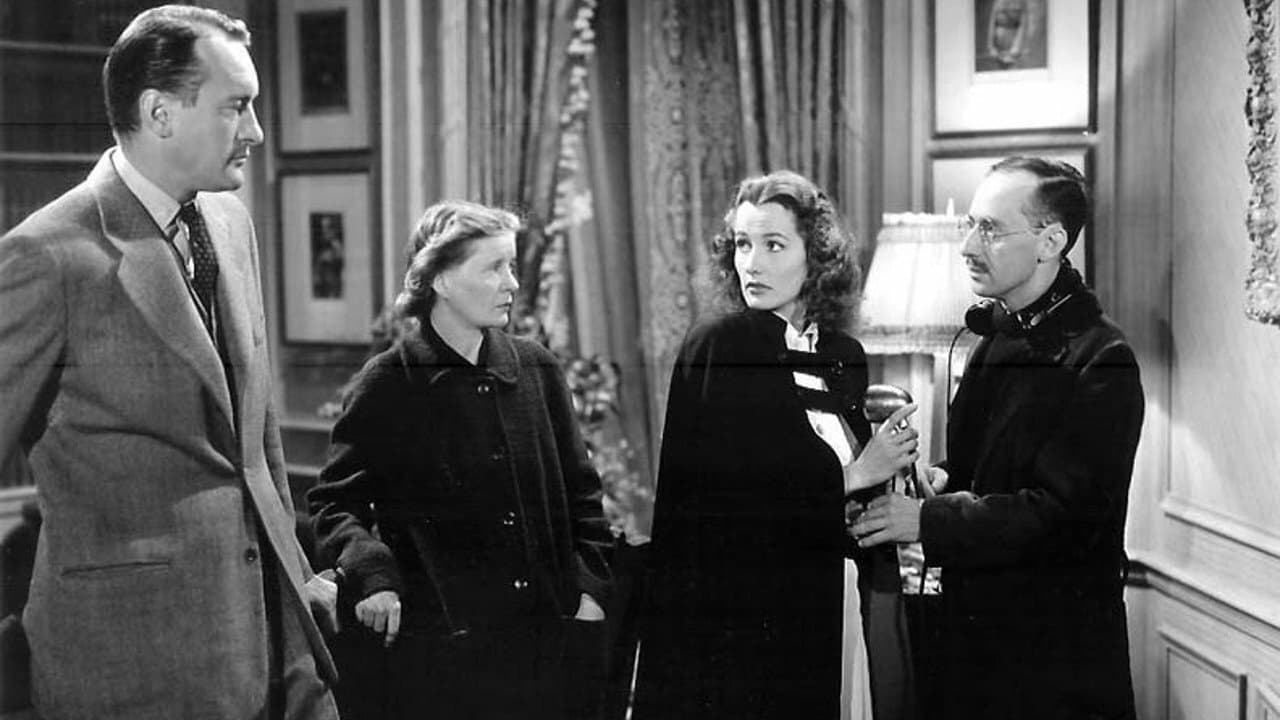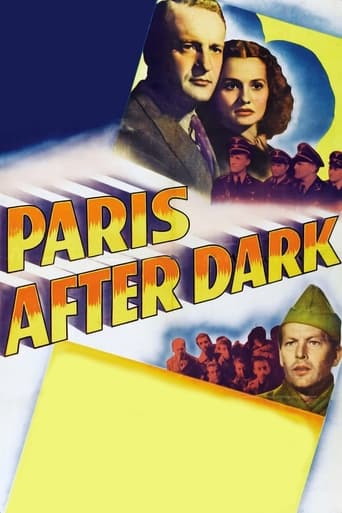BootDigest
Such a frustrating disappointment
Sarita Rafferty
There are moments that feel comical, some horrific, and some downright inspiring but the tonal shifts hardly matter as the end results come to a film that's perfect for this time.
Beulah Bram
A film of deceptively outspoken contemporary relevance, this is cinema at its most alert, alarming and alive.
Staci Frederick
Blistering performances.
gordonl56
Paris After Dark 1943This 20th Century Fox production, is another one of the myriad of mid WW2 films about the French Resistance against the German occupiers. This one stars George Sanders, Brenda Marshall, Philip Dorn, Marcel Dalio and Madeleine LeBeau.George Sanders is a doctor working at a Paris plant that is making tanks for the German Army. He is also the leader of the local French Resistance group. His number 2 is Brenda Marshall, who is also his nurse at the plant hospital. The group mainly just posts leaflets and such calling for sabotage of products and materials for Germany.Philip Dorn, Marshall's husband, returns to the family after several years in a German P.O.W. camp. The Germans have released prisoners that are too sick to work for their cause. Dorn is a broken man, both is body and spirit. He wants nothing to do with the resistance movement etc.The anti-Nazi group work out of a hidden room in the local café. They hold their planning meetings there with the odd get together at the home of Sanders. (The radio to London is hidden there) The local barber, Dalio, is a collaborator in the employ of the Gestapo. He makes a tidy bit of cash reporting on any funny behaviour in the area.The Germans decide they are going to round up 500 able-bodied men and send them to Germany to work. Several of the younger lads, including, Marshall's younger brother, Raymond Roe, decide to head for Spain. They are however rounded up by the Gestapo types on a tip from Dalio.This of course goes nowhere good for young Roe. He is shot by the German officer in charge of the area. The Nazi swine, Robert Lewis, is then shot by Marshall from an upstairs window. Marshall is not seen doing the deed. Lewis is badly wounded and Sanders is forced by the German's to save Lewis. If he fails, the Gestapo will shoot 50 hostages. Marshall is also drafted in to help save the man you had killed her brother.Sanders and Marshall manage to save the Nazi officer's life, thus saving the 50 hostages from death. The Germans however go back on their word, and order the hostages shot unless the person who shot Lewis comes forward.All this has convinced Dorn that he can no longer stay out of the fight. He tells Sanders that he will confess to the attack on Lewis. But he wants Sanders to make sure that he gets his wife, Marshall to safety. Sanders, agrees, and promises to get the woman to England.While not the best of the "resistance" type films, it does keep the viewer entertained. Sanders is always worth watching. Dorn, Miss LeBeau and Dalio had all escaped Europe just ahead of the Nazi's and ended up in Hollywood. Dalio and his ex-wife LeBeau would have parts in the best example of the genre, CASABLANCA.The director, Léonide Moguy was also an escapee from the German invasion of France. His Hollywood films include, WHISTLE STOP and ACTION IN ARABIA (also with George Sanders)
Jay Raskin
N.Y. Times critic,Bosley Crowther calls this "a stilted melodrama which is both graphically and emotionally dull." I found it stirring, uplifting and well done. The movie is romantic entertainment in the style of "Casablanca," with a similar anti-Nazi message. The Humphrey Bogart, Ingrid Bergman, Paul Henreid parts are played by George Sanders, Brenda Marshall and Philip Dorn. George Sanders is especially impressive. It is amazing how he can go so easily from a Nazi ("Man Hunt," 1941)to an anti-Nazi here. Marshall and Dorn are fine. Kid actor,Raymond Roe, stands out in the uncredited part of an heroic teenager named George. Some reviewer on this site complained that Sanders didn't use a French accent, while all the other characters did. I don't think that is a real problem. Obviously, none of the characters would have been speaking English if the film was really taking place in France, but then American audiences would not have been able to understand the picture if they did that. I don't think Sanders adding a French accent would have added any realism to the movie. A movie audience accepts it as a convention that the dialogue is supposed to be taking place in French and that the producers are doing it in English so that the story can be understood by Americans. Accents are really optional and Sanders probably made a good choice not to affect one in a movie with many real French actors.Anyways, the movie moves quickly, delivers a good deal of suspense and has a lot of nice and surprising twists and turns.
Martha Wilcox
George Sanders plays a French doctor without a French accent. He plays Germans well and even speaks in a German accent, but he can't play a French doctor without sounding quintessentially English.The young brother of the French protagonist, Jean, is quite bold and brave standing up for what he believes and speaking out against oppression. To be honest it;s the French characters that make this film work. Sanders merely lends his name to sell the film, but he contributes very little in terms of his performance.I would advise Sanders fans to stay away from this film as it comes nowhere near the quality of 'Manhunt' or 'Tales of Manhattan'.
richard-1787
This movie has a lot of weaknesses, but its heart is in the right place, and there are definitely good moments for those who enjoy this sort of movie.The only other reviewer of this movie here on IMDb mentioned "Mrs. Miniver," and the comparison is very valid. That very stirring if often melodramatic movie was made to convince Americans in the early 1940s, still given to isolationism, that the English were worth helping because they were good, decent, and courageous people."Paris After Dark" is very similar in that it was made to convince Americans that France, too, merited our help. The situation was very different, however, so the convincing had to be different.France had declared an armistice shortly after being overrun by the Nazi war machine in 1940. Maréchal Pétain, head of the French armed forces, convinced the government to do so, and then collaborated with the Nazis for the rest of the war, for which he was tried after it. As a result, many Americans saw the French as cowardly and lacking in the sort of moral fiber that "Mrs. Miniver" spends all its time demonstrating to be the very essence of the English character.So "Paris After Dark" spends a lot of time arguing that 1) the average Frenchman and -woman, Joe/Jane France, was really courageous, and had had nothing to do with signing the armistice, and 2) that all of France, all classes and both sexes, were already fighting the Nazis through the Resistance, even at the risk of their own lives - thereby showing their courage, moral fiber, etc.This produces a lot of stirring speeches by various of the characters, which, admittedly, often come off as unnaturally oratorical. But you can see what the scriptwriters and the director were trying to achieve.The acting is uneven. George Sanders and Philip Dorn are both very good. Both are men who have to be won over to the Resistance efforts, and their conversions are convincing. Brenda Marshall, the female lead, sometimes overacts, and is not at their level. Marcel Dalio, so good in so many movies, doesn't do a convincing job with the traitor barber.If you've seen American movies made in the 1930s that are set in France, you know that Hollywood had often presented the French as rather foolish. Here it does an admirable job of presenting a wide spectrum of French folk, among them lots of average but very noble individuals.Yes, it's preachy at times. But the cause justified that.If Hollywood's contributions to the war effort interest you, you will find much of interest here.-------------------A note after a second viewing: This movie, released in 1943 before we had landed on the Normandy beaches, deals with France at what was a real turning point in the Occupation.On the one hand, the collaborationist prime minister, Pierre Laval, had just negotiated an exchange of workers to be sent to Germany - the STO, Service du Travail obligatoire - in exchange for French prisoners to be released home to France. (The Germans were holding 1.9 million French soldiers prisoner as part of the Armistice Pétain signed in June, 1940.) The ratio was 3:1, three Frenchmen - or women - sent to Germany to work in exchange for one French soldier to be released. It created further hatred for Germany, as the occupying forces began enforcing the "obligation" for men to leave. Many faced with such deportation joined the French Résistance, as Georges and his three friends try to do in this movie.On the other hand, American forces landed in French North Africa - Morocco and Algeria - at the end of 1942, and after a rather swift campaign, defeated the Germans and Italians there. (If you've ever seen "The Desert Fox", you know that story.) It was called Operation Torch, and, as we see near the end of this movie, it gave the French their first real shot of hope that the Allies had not abandoned them and would, someday, free France as well.As I wrote above, a lot of this movie is oratorical. People give speeches, sometimes even to the camera. But the last part, where Jean is won over to the cause of the Resistance, is really very moving.

